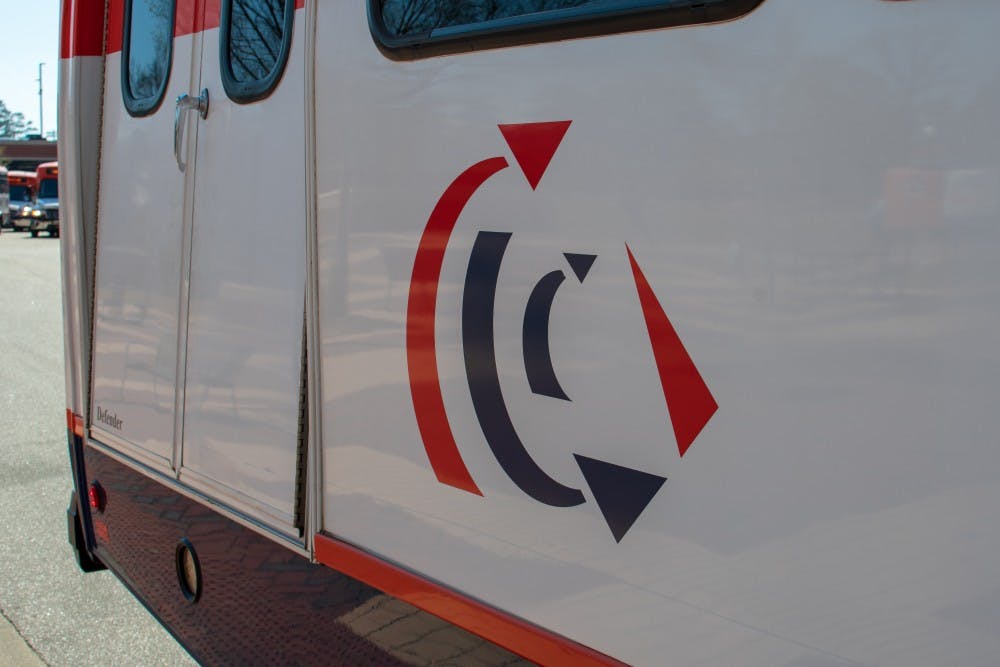Transportation Services is looking to proceed as normal with its programs in the summer and fall as students and University employees return to campus.
The Plainsman spoke to director Don Andrae, who outlined safe health practices being introduced to campus transportation and detailed a new scooter share program launching this fall.
Tiger Transit
Tiger Transit will resume operations on June 29 with the start of the second summer semester, performing on the same limited schedule used for summers in the past.
"[Summer is] going to give us an opportunity to try out some of the things we have planned for the fall to make sure they’re going to work," he said.
Only 30 Tiger Transit buses will run at a time in the summer, rather than the 56 in use in the fall, and the service will stop at 5 p.m., according to Andrae. The weekly shopping shuttle will be available on Friday evenings.
Buses have been reworked for their return next week to ensure the safety of drivers and passengers, with face coverings playing a large role in how transit will run in the summer and fall.
"You must wear a mask to get on the bus," Andrae said. "We’re having stickers on the windows [saying this]. We will not let anyone on the bus unless they have a mask; we’ve been telling all the Camp War Eagle sessions that we’ve been doing the same thing."
Drivers will also be required to wear masks, and a Plexiglas shield has been installed in each bus around the driver’s seat to reduce the spread of germs. Buses will be partially disinfected between some rides, Andrae said.
"We won’t be able to clean [railings] all the time," he said. "We will be cleaning them throughout the day, but we won’t be able to clean them every time. We will have hand sanitizer on the bus for you to clean your hands when you get off or get on."
Transportation Services consulted with Dr. Fred Kam and the University Medical Clinic about physical distancing in buses, but it was determined that there would not be a specific capacity limit needed for each bus. Instead, Andrae said drivers will attempt to ensure standing room occurs less often in the fall.
"We talked to Dr. Kam extensively about the buses and asked him what his opinion would be if we required the driver as well as every passenger to wear a mask, would we need to do the spacing that the [Centers for Disease Control] requires on transit," Andrae said. "He said that if everyone has a mask on, 'I would not put everybody in every seat, but I would not worry about putting eight people on the bus.'"
With the new face covering policy implemented on Tiger Transit, Andrae said some may want to consider different means of transportation, such as carpooling with friends or using the University’s late-night ride program in partnership with Lyft that launched in January.
"We are trying to encourage people to look at other alternatives for getting to campus," he said, "knowing that we are not going to social distance because if we did, we would only be able to get eight people on the bus."
Routes will remain largely unchanged from the spring 2020 semester, save for one route connecting to the Creekside housing community to benefit students living there.
"People at Creekside were disturbed by the fact ... they were the last stop on the route coming back," Andrae said. "We made a change where they have actually almost a route by themselves. We put a stop on Dean Road [before], and the City was not happy with that — we encouraged students to get off there, but of course, they did and walked across Dean, which was not good."
Scooter and Bike Share
A new scooter share program is on track to launch beginning in August. Transportation Services began developing the program after renewing its contract with Gotcha, its vendor for the War Eagle Bike Share program, which will supply the scooters.
Transportation Services hopes students use will use these scooters as one alternative to getting around campus.
The new scooters will have programmed areas on campus property where they can be used, Andrae said. For now, this will range from RO parking lots on the west end of the main campus to Petrie Hall and from the Hayfield parking lot on South Donahue Drive to Petrie Hall.
"It’s a pilot program — we’re going to tell students that the future of the scooters at Auburn depends on how well we utilize what we have given you,” Andrae said. "If we find scooters all over the place, they’ll be gone the next day."
Scooters will initially be located at three rental stations being installed across campus: in the Hayfield area; on West Thach Avenue near the RO parking lots and on Thach Concourse beside Petrie Hall, Andrae said. He estimated between 200 and 300 scooters will be available to students.
In addition, all 200 bicycles in use for the War Eagle Bike Share program will be replaced with e-bikes near the start of the semester, Andrae said. The e-bikes will be disinfected when possible, but cleaning will be less frequent than with Tiger Transit buses.
"Gotcha has a very good cleaning program, but they certainly can’t clean them after every use," he said. “They will clean them periodically throughout the day."
Students interested in using the e-bikes or scooters may purchase a permit covering either a semester of rides or a full calendar year, according to Andrae. Previously, students who rented a bicycle as part of War Eagle Bike Share were allotted two free hours a day before being charged $5 each additional hour.
"The semester rate will be $74.50; it allows you to use 20 minutes per ride on either a scooter or a bike, but there's really no limit per day," he said. "The annual rate is $149."
Transportation Services is considering creating a package discount that combines the e-bike and scooter permit with a C zone vehicle parking permit. This would be $150 with the semester e-bike and scooter permit and $175 with the full year permit, Andrae said.
"It would all go on your e-bill, whereas most of the time right now ... you have to use your credit card on the app," he said, referring to how payment for War Eagle Bike Share has functioned.
Other Transportation
jAUnt, War Eagle Express and the Employee Express, which are all managed by Transportation Services, will see slight modifications similar to Tiger Transit.
"All three of those will have the same requirement: that you must have a mask to get in," Andrae said.
jAUnt and War Eagle Express golf carts will observe some physical distancing guidelines that aim to "keep people away from the driver as much as possible," Andrae said, which he admitted may be more difficult than with Tiger Transit buses.
Employee Express vans will only be permitted between three and five passengers at once, and no one will be allowed to sit beside or directly behind the driver's seat. Much like buses, the vans will have a Plexiglas shield surrounding the driver.
"A van is just more difficult to ventilate in there," Andrae said about the passenger limit. "[With] buses we'd be able to have the windows and the top open, so it'd be well ventilated."
Vans used for the Auburn University Security Shuttle program, managed by Campus Safety and Security, will undergo the same adjustments, Andrae said.
Do you like this story? The Plainsman doesn't accept money from tuition or student fees, and we don't charge a subscription fee. But you can donate to support The Plainsman.

Tim Nail, junior in journalism, is the campus editor for The Auburn Plainsman.





